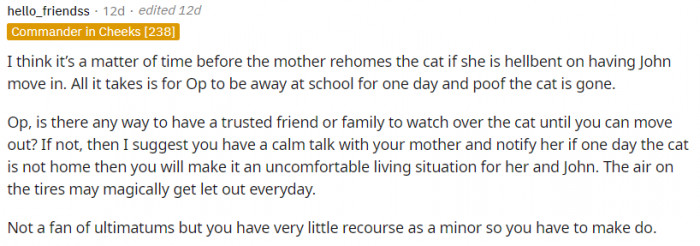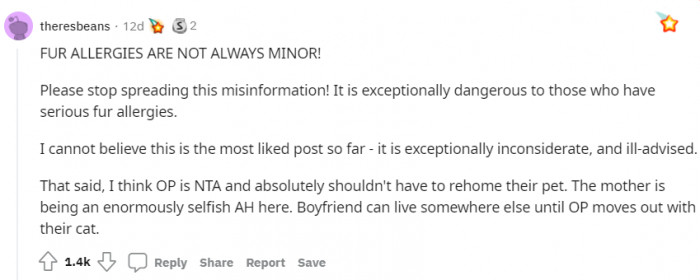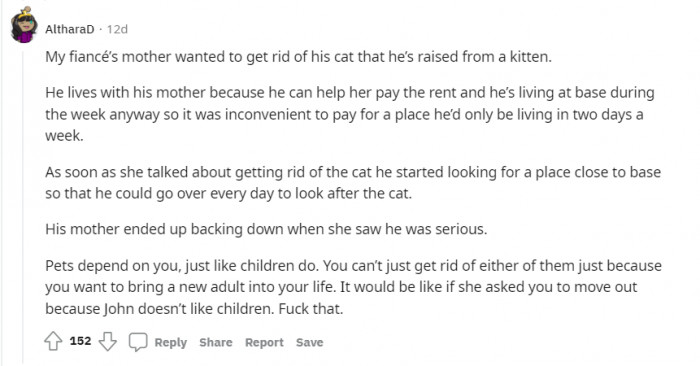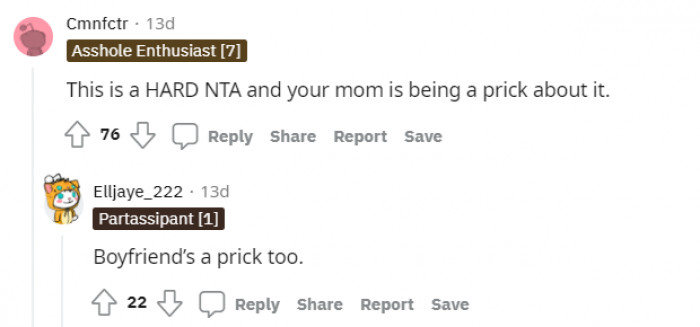Reddit Users Weigh In On Whether Or Not This Pet Owner Is A Jerk For Refusing To Re-Home Her Cat When Her Mother Asked Her To
Our beloved pets will always be part of our family. So if you're forced to let your cherished cat go because someone who is allergic to cats comes into your life, the situation simply feels unfair.
This is what happened to a user who asked a question on the popular subreddit "Am I the Asshole?" (AITA). Unfortunately, her mom is in a relationship with someone allergic to cats, and that person is moving in with them soon.
Naturally, she would refuse. Think about it: Why would you give up your beloved cat just because a stranger suddenly wants to move in with your mom?
On the other hand, the mom loves her partner so much that she's okay with him moving in. Because she is concerned about her partner's health, she had no choice but to ask her daughter to rehome the cat.
While it's true that cat allergies can't be cured, experts suggest a method called immunotherapy, which helps strengthen tolerance. However, for some people, living with cats is out of the question.
Other users in the thread even mention that cat allergies can send some people straight to the hospital. Some even experience life-threatening anaphylactic shock and severe asthma caused by an allergic reaction.
So which side are people on? Let's find out!
The AITA question.

Some people, like this user, no longer trust the mother.

Perhaps these are the only methods for the minor.

The Emotional Complexity of Pet Ownership
The decision to re-home a pet can evoke a complex mix of emotions, both for the owner and the animal involved. Research indicates that pets are often seen as family members, and the thought of giving them up can lead to feelings of guilt and sadness.
According to studies in animal welfare, re-homing decisions can significantly impact the emotional well-being of both the pet and the owner, highlighting the need for careful consideration before such actions are taken.
Understanding these emotional dynamics is crucial for responsible pet ownership.
Even those who are aware of fur allergies are on the original poster's side.

This makes a lot of sense.
As a teenager, cohabiting with someone who is almost a stranger, especially a man, isn't the best situation. Regardless of whether the mom loves this person, moving in is such an abrupt decision.

This user's fiancé is almost in the same situation.

Moreover, the societal perceptions surrounding pet ownership can add pressure to individuals facing difficult decisions. Cultural norms often dictate that pets should be cared for unconditionally, leading to feelings of inadequacy when owners struggle to meet those expectations.
Research published in the Journal of Applied Animal Welfare Science emphasizes the importance of empathy and support systems for pet owners facing challenges.
This highlights the need for open communication and understanding within families and communities regarding pet care responsibilities.
A couple of them do not trust the guy.

This is so true! You can't just abandon your pets.

Another true statement.

The Role of Responsibility in Pet Ownership
Taking responsibility for a pet requires a commitment that can sometimes feel overwhelming. Research in human-animal studies suggests that owners must assess their emotional and practical ability to provide care before adopting a pet.
When individuals feel unable to meet their pets' needs, it can lead to feelings of stress and anxiety, which may result in neglect or re-homing.
Recognizing one's limitations is essential for promoting responsible pet ownership and ensuring the well-being of the animal.
This Reddit user suggests going straight to the source of the problem.

Two cases of cat allergies.

For some people, cat allergies can turn into something worse.

To address the challenges of pet ownership, experts recommend developing a support system that includes family, friends, and community resources.
Studies suggest that having a network of support can alleviate stress and provide practical solutions for pet care, making it easier to manage responsibilities.
This approach aligns with research on social support, which indicates that individuals with strong support systems are better equipped to handle life's challenges.
They obviously don't like the mom and the boyfriend.

Sadly, it seems that her mom is indeed choosing the man over her daughter, who is still a minor.

Sometimes, it just takes honesty.

Exploring Alternatives to Re-Homing
For pet owners facing difficulties, exploring alternatives to re-homing can be beneficial. Seeking professional guidance from veterinarians or animal behaviorists can provide insights into managing pet-related challenges.
According to studies in animal welfare, many issues can be resolved through behavioral training and environmental modifications, reducing the need to consider re-homing.
This highlights the importance of understanding the underlying causes of behavioral issues and addressing them proactively.
Some are thinking ahead.
The mom could possibly send the cat away without the daughter knowing about it. She could be at school, and by the time she goes home, her beloved feline could already be gone.

This user is also worried about what the mother would do.

Most people think that the mom is being unreasonable. Indeed, she needs to take care of the well-being of her minor daughter first.

Additionally, involving family members in pet care can foster a sense of shared responsibility and support. Research indicates that when families work together to care for pets, it enhances the overall experience and reduces individual stress.
Creating a family plan for pet care can help distribute responsibilities and ensure that everyone is on the same page, fostering a collaborative approach to ownership.
He's the one who's moving in, so he should be the one who's willing to adjust.

Unfortunately, some posts were spreading misinformation, so concerned users had to counter them with facts.

So who do you think is the asshole here?
Generally speaking, people consider the mother to be the AH. If you just take a look at the situation, it's beyond the cat allergies of the guy.
The daughter barely knows the guy, yet he has decided to move in. For some of the Reddit users, it's like a decision that was not carefully considered.
We wish the best for this 16-year-old girl. Let's hope that she'll be together with her cat no matter what happens.
Addressing the Stigma of Re-Homing
Addressing the stigma surrounding pet re-homing is crucial for promoting a more compassionate understanding of this decision. Many individuals fear judgment from others, which can exacerbate feelings of guilt and inadequacy.
Research in social psychology suggests that fostering an environment of empathy and support can help reduce stigma and promote understanding.
Encouraging open conversations about the challenges of pet ownership can lead to more supportive communities, allowing individuals to seek help without fear of judgment.
Ultimately, fostering a culture of understanding around pet ownership can lead to healthier outcomes for both pets and their owners. As communities learn to empathize with the challenges of pet ownership, they can create support systems that promote responsible care and reduce the necessity for re-homing.
By focusing on communication and understanding, we can create environments where both pets and their owners thrive.
Psychological Analysis
This situation sheds light on the emotional complexities surrounding pet ownership, particularly when faced with the prospect of re-homing.
Creating an open environment where individuals can discuss their challenges without fear of judgment is crucial for promoting responsible pet ownership.
Analysis generated by AI
Analysis & Alternative Approaches
In conclusion, the complexities surrounding pet re-homing highlight the emotional and practical challenges faced by pet owners.
Promoting understanding and support within communities is essential for fostering responsible pet ownership.
By addressing the stigma and offering resources, we can create environments that support both pets and their owners in navigating difficult decisions.



